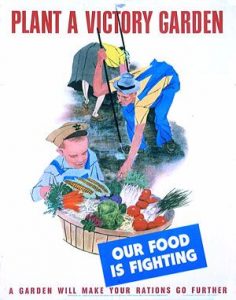During the hard years of WWII, when truly massive amounts of canned American foods were shipped overseas to feed soldiers and allies, the American government promoted the home garden as a means to victory.
 Americans answered the call, planting gardens in yards and empty lots, even on rooftops. It’s estimated that 20 million Victory Gardens produced 10 million tons of fruits and vegetables, an amount nearly equal to the nation’s commercial production during the war years. In 1943, Americans purchased almost 400,000 canners to preserve that harvest, a five-fold increase over the previous year and a total unmatched since.
Americans answered the call, planting gardens in yards and empty lots, even on rooftops. It’s estimated that 20 million Victory Gardens produced 10 million tons of fruits and vegetables, an amount nearly equal to the nation’s commercial production during the war years. In 1943, Americans purchased almost 400,000 canners to preserve that harvest, a five-fold increase over the previous year and a total unmatched since.
In addition to relieving much of the pressure of a food distribution system strained to the hilt, Victory Gardens provided a tremendous morale boost. Young or old, rich or poor, male or female, everyone could help the war effort. Everyone could enjoy the fruits (and in many cases, vegetables) of this collective patriotic effort.
The government stopped promoting Victory Gardens when the war ended. In response, Americans stopped planting and went back to the grocery store. Though sporadic food shortages broke out across the country as the national food distribution system struggled to reorient itself from wartime production, they were brief and quickly forgotten. The collective effort of million of Americans growing their own food was no longer needed, or so it seemed. But it’s a shame that we gave up our Victory Gardens, because the garden cannot just provide a chance to beat an overseas menace, it can provide you with victories right here at home.
Gardening is good for your pocketbook.
Three ounces of dried, crushed oregano leaves for your “homemade” spaghetti sauce will set you back $6 at Walmart. A package of 200 oregano seeds costs half that amount, and the perennial plants that you grow from them will keep you in fresh oregano for a lifetime. A single bell pepper will cost you a buck or two, a bell pepper plant will provide you with fresh peppers all summer long. An apple tree costs the same as five pounds of apples, and can provide you hundreds of pounds every year. The difference, of course, is made up by your work. But it’s work performed directly for your loved ones – you pay neither income tax nor sales tax on a plate of steamed carrots from your garden.
We are all looking for ways to become anti-fragile, to disengage from a system that has economic leverage over us and thereby holds us in bondage. Gardening is an economical way to reduce the worries of job loss, inflation, even economic collapse. Having plenty of fresh fruits and vegetables on hand, grown by hand, can go a long way to providing you with economic freedom.
Gardening is good for your health.
Growing your own vegetables and fruits is the best way to provide fresh, nutrient-dense foods for your family. The lettuce you’ve grown yourself is better for the kids than lettuce grown in Mexico, covered in pesticides, then driven a thousand miles by truck to your local Wal Mart. Your own corn on the cob tastes better, it is better, than that can of creamed corn on the bottom shelf of your local grocer.
 We are a fatter people than we have ever been before – than has ever existed anywhere – and part of that can be laid upon the foods we buy. Take a look at the label of your favorite boxed or canned food, then compare it to the label on your own, home-grown tomato (hint: if you find one, it will say “tomato”). A steady diet of partially hydrogenated vegetable oil, potassium benzoate, and calcium disodium edta is not doing our health any favors. You simply cannot eat fresher, healthier food than what you’ve grown yourself.
We are a fatter people than we have ever been before – than has ever existed anywhere – and part of that can be laid upon the foods we buy. Take a look at the label of your favorite boxed or canned food, then compare it to the label on your own, home-grown tomato (hint: if you find one, it will say “tomato”). A steady diet of partially hydrogenated vegetable oil, potassium benzoate, and calcium disodium edta is not doing our health any favors. You simply cannot eat fresher, healthier food than what you’ve grown yourself.
Time spent in the garden is also better for your body than time spent watching TV or reading Drudge. In the garden you are moving, stretching, lifting – all those motions that your muscles are not getting while you sit at a desk all day. Start a garden project, whether building raised beds or transplanting raspberries to a new trellis, and you’ll be amazed how sore you can wake up the next day. And the result is far more emotionally satisfying than walking on the treadmill.
Gardening is good for your soul.
If the Heavens declare the glory of God, the dirt declares His careful planning. Everything in the garden works together. Everything has a purpose and a place. Almost nothing goes to waste. One can choose to believe that such an elegant interconnectedness of life arose from time and chance, or one can see the loving hand of a Creator in its design.
I’ve never met a gardener who was also an atheist. Perhaps that’s a function of where I live – such fools are few and far between here. Or maybe it’s just hard to disbelieve in a Creator when buried up to one’s elbows in His creation.
Gardening, especially quiet hours spent gardening alone, provides an opportunity to contemplate the miracles of life and of growth. The frustration of weeding recalls to us the curse under which we live in this broken creation, which itself groans in its bondage until our Savior’s return. Harvest time is an experience of God’s goodness toward us and His providence for our needs. There is time here to talk to God, and to listen, and to learn.
It is perhaps not a coincidence that the first man was tasked with tending a garden, and in that garden he met God. God is still there, and while the potatoes, carrots, and tomatoes you grow will sustain you, their Creator will nourish your soul when you seek Him.










4.5
Nothing better that a summertime BLT made with ingredients harvested minutes before eating.
(Except for the bacon… my bacon seeds didn’t come up AGAIN, last year.)
The great parody song about homegrown tomatoes was not written in vain. There is NOTHING like homegrown tomatoes. I don’t have a garden at the moment, but I do have several farmer’s markets within driving distance. Their seasonal produce is just beyond wonderful.
Only two things money can’t buy
That’s true love and homegrown tomatoes
5
I would enjoy reading a follow up article on how to get started.
To toot my own horn : https://www.menofthewest.net/grow-or-die/
Start with David the Good’s website and books.
Can confirm.
Another place to support is also Castalia House publishing over at Vox Day’s Blog. Lots of good linkage at his place. Another good source for some decent gardening books is a well stocked local library in any community across the country.
Boy your chili is running very high and spicy today El Borak. Gardens and the knowledge of how to create them are becoming very important right now again. Something else to learn too is seed keeping/preserving. Lots of people garden, but they have no knowledge of how to preserve seeds for next year. What if the supply of commercially sold Burpee seeds suddenly vanishes? What then?
One thing I wanted to say, is Walmart is a lousy place to shop for most produce. They depend on distribution wholesale places where the fresh produce sits for days. Frozen or even canned is actually a better way to go if you know the sources. That produce is frozen or canned within literal hours of being picked.
For those who cannot manage a garden, they should check their local area stores produce sections. Lots of stores have deals with the local area farmers in the region and you can get some great produce.
Also at those stores, check the bulk section for spices and herbs. The turnover is very high and the spices and herbs are so much cheaper than buying the bottled stuff off the shelf. You are paying for the bottle if you buy off shelf. A good option for folks is to invest once in the bottled version, then simply go refill it at the bulk section of their supermarket. Nice thing is, you can buy as little or as much as you need. You are only paying for the hers/spices, not the container. I am lucky in that I have two stores that I can buy nice and fresh bulk herbs and spices, pastas and all kinds of wondrous items, very fresh and cheaply priced.
“Walmart is a lousy place to shop for most produce”
Indeed. I only chose their price because I happen to have the WalMart app on my phone and was able to check their crushed oregano leaf price easily. As for me, I grow so much oregano (it’s a perennial, I mean come on!) that I had to buy my lovely bride a still this year to distill oregano oil because there’s no way we can eat all I produce. We simply have to do something with the overage.
But that’s related to a piece of advice I would offer Thranite. While I’m happy to do articles on demand, I do not want to turn Men of the West into a gardening blog. While I would wish that we would all be gardeners now and suspect that we will all be gardeners inside a decade — for reasons Al Gore will never understand — this site has another focus. So I would recommend David the Good, as well as many of the hundreds of Youtube channels that cater to gardeners. Even if you know nothing about gardening, you’ll quickly learn which are worthwhile and which are crap.
If you want to learn to garden in a general sense, your local extension office can probably point you toward some really good and inexpensive classes. I still take them myself, though I’ve gardened for decades.
But like many men I learn better by doing something. So if you want to learn the El Borak way,
1) Go buy a packet of seeds.
2) Watch 2 Youtube videos on how to plant them.
3) Plant them.
IOW, take 10 minutes and get started. Maybe none of your seeds come up. Discover why. Maybe they all grow 1″ and turn yellow. Discover why. In short, don’t expect to learn to grow food by reading; learn to grow food by trying to grow food. Experiment and correct your mistakes. Try something normal and something outrageous. Grow tomatoes upside down. Mix daffodils in with the bush beans.
In the West, we approach learning one way: teach me and I’ll understand enough to do it. In the East they say, Do and you will understand it. Mix them together. Learn and do, fail and learn. If you kill 200 oregano plants, so what? If you’re smart about it, you’ve learned something from the experience.
Don’t worry about doing it right, at least not at first. Instead, make an effort to do something and to learn from your successes and your failures both.
And never, ever grow something that you don’t want to eat. You won’t care if it lives or dies. Instead, grow something that you love and then deny yourself the pleasure of buying any until you eat your own. Do it right, and you’ll never buy any again.
Thanks all for the pointers. El Borak, a well considered response, I appreciate it.
My pleasure, sir.